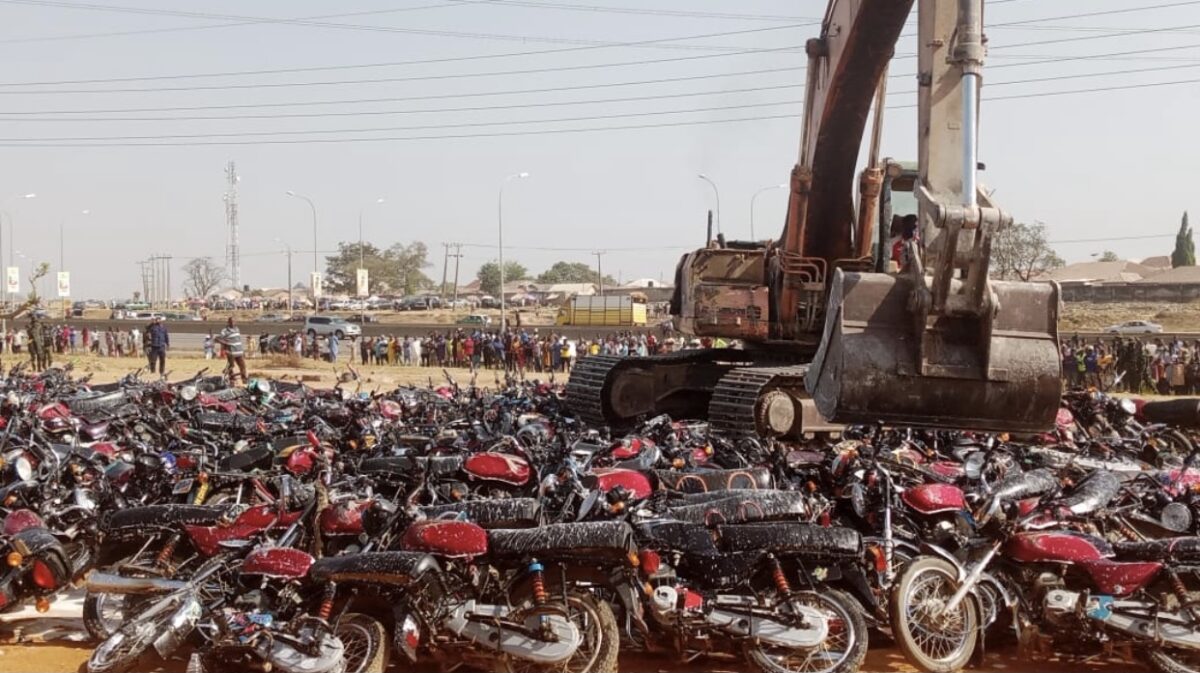The ban by some states and the Federal Capital Territory (FCT) on the operations of commercial motorcycles (generally called Okada) in specific areas has earned sustained public commendation. But more condemnation has trailed the destruction of seized motorcycles. Videos emerged recently of the destruction of seized motorcycles in the Federal Capital Territory and Lagos State, respectively. This act is not only in violation of the fundamental rights of the owners but also makes no economic sense.
The Okada operators, as citizens, have the right to ownership of property, which should not be taken away so easily.
Governments banned motorcycle operations in parts of the country due to the notoriety of the operators of commercial motorcycles against traffic rules in most Nigerian cities and the risk to which their recklessness exposes the lives of other road users. However, destroying the seized motorbikes from violators of the ban is not seen to be the wisest of options.
In Abuja, for instance, the joint enforcement team of the Federal Capital Territory Administration (FCTA) on Thursday, December 8, 2022, crushed over 400 seized motorcycles. According to FCTA authorities, the crushing exercise, which was witnessed by senior officials of the FCTA, was in furtherance of its commitment to the ban on commercial motorcycles within the nation’s capital city, Abuja. The exercise took place inside an open space at Lugbe Car Wash, along the airport road corridor.
NDDC railway project will stimulate economic activities in Niger Delta – IYC
Kuje jail attack: FG promotes officer for gallantry
To achieve maximum success, the team that carried out the crushing exercise was accompanied by operatives from the police, military and paramilitary, who stormed and ransacked Okada operators caught while operating in the restricted areas. Areas raided include Bill Clinton interchange, Karon-Majiji, Kuchingoro, Piwoyi Junction near Shoprite mall, Lugbe FHA, popular Lugbe Car Wash, and Police signboard along the airport road, all in Abuja Municipal Area Council (AMAC) of the FCT.
Explaining the exercise, the Secretary of the FCT Transportation Secretariat, Abdullahi Adamu Candido, reiterated the government’s efforts and commitment to ridding Abuja city of the menace; warning operators and owners of commercial motorcycles to keep off the restricted areas, including all the major roads of Abuja city as well as the gateways into the FCT.
Similarly, the director of the Directorate of Road Traffic Services (DRTS), Abdulateef Bello, said the exercise, which is the third in the series of its signature enforcement of the ban on Okada operations in the city, is proof of its zero tolerance of the menace. According to him, the continued insistence by commercial motorcyclists to operate in the city is no longer a traffic offence, but a serious security breach that required the intervention of the government.
In a similar development, the Lagos State Government had in June 2022 crushed about 2,000 impounded motorcycles in Ikeja. This, according to the Lagos State Commissioner for Information and Strategy, Mr Gbenga Omotoso, was in line with its ban on commercial motorcycle operations in the state. The state government had on June I, 2022, banned their operations in six local government areas (LGAs) and nine local council development areas (LCDAs).
In a statement by its spokesman, Abdul-Azeez Suleiman, the Coalition of Northern Groups (CNG) disclosed that the Lagos State government, in just 72 hours of announcing the ban on bikes, had subjected 7,548 motorcycles to the crushing machine.
Security operatives have been alleged to be part of the problem in the enforcement of the ban on the operations of Okada operators. They offer information to the latter on the periods the task force on the enforcement of the ban would be on patrol. The Okada operators use such details to choose when to operate without being caught. While we advise the task force to have an intelligence unit that would check for bad eggs among security agents, we encourage relevant authorities in the Directorate of Road Traffic Services to organise public enlightenment sessions that would educate Okada operators against the consequences of flouting the ban on their operations.
Also, one way of enforcing the ban is to ensure that the riders are occupied through other means to earn a living. If the motorcyclists were provided with options through which they could earn a living, many of them would not return to the roads.
Sadly, some of these motorcycles are given out to youths under the empowerment programmes of some state governors, after which the same states turn around to ban the operation. There is a need to review this issue critically with a view to finding a lasting solution. Governments must come up with better empowerment programmes to help tackle poverty.
The destruction of seized motorcycles does not only ruin legitimate livelihoods but is also a disaster for entrepreneurship. Crushing the bikes amounts to quashing millions of naira needed to propel the national economy. The destruction of seized motorcycles is, therefore, not a wise option for stopping Okada operators from violating the ban on their operations in restricted areas. Providing alternatives to motorcycle operations to the riders is a better way to handle this issue.

 Join Daily Trust WhatsApp Community For Quick Access To News and Happenings Around You.
Join Daily Trust WhatsApp Community For Quick Access To News and Happenings Around You.